
Copyright 1998 Conari Press
All Rights Reserved. No part of this book may be used or reproduced in any manner whatsoever without written permission, except in the case of brief quotations in critical articles or reviews. For information, contact Conari Press, 2550 Ninth St., Suite 101, Berkeley, CA 94710.
Conari Press books are distributed by Publishers Group West
Cover photography: Theresa Vargo
Cover art direction: Ame Beanland
Designed & electronically produced: Suzanne Albertson
Diagram illustrations: Joan Carol
Library of Congress Cataloging-in-Publication Data
Seton, Susannah, 1952
Simple pleasures of the garden : stories, recipes & crafts from the abundant earth / Susannah Seton.
p. cm.
Includes index.
ISBN 1-57324-104-0 (hardcover)
ISBN 1-57324-501-1 (paperback)
1. Gardening. 2. Gardens. 3. Nature craft. 4. Cookery (Vegetables). 5. Seton, Susannah, 1952. I. Title.
SB455.S43 1998
635dc21 97-46743
Printed in the United States of America on recycled paper.
03 02 01 00 Data Repro 2 3 4 5 6 7 8 9 10
www.redwheelweiser.com
www.redwheelweiser.com/newsletter
If you want to be happy
for an hour, have a party.
If you want to be happy for
a week, kill your pig and eat it.
But if you want to be happy
all your life, become
a gardener.
Chinese Saying
Simple Pleasures of the Garden
E ARTHLY DELIGHTS
The lesson I have thoroughly learnt, and wish to pass on to others, is to know the enduring happiness that the love of a garden gives.
Gertrude Jekyll
 ike many folks, pleasure is not a concept that is native to me. A serious, A student, high-achieving, puritanical type all my life, I've been what author Stella Resnick calls, in her book The Pleasure Zone, pleasure resistant. It is only recently, in my midforties, that I have begun to try to focus on, indeed relish, the good things in life. The first step was to identify the things that gave me pleasure. In so doing I came to see that they were all very simplelying in warm water, the smell of sweet olive blossoms in the air, the feel of clean sheets, or the sight of a hummingbird darting on my deck. From that foray came the book Simple Pleasures: Soothing Suggestions and Small Comforts for Living Well Year-Round in which my co-authors David Greer and Robert Taylor and I asked people what were the simple things that added delight and meaning to their lives.
ike many folks, pleasure is not a concept that is native to me. A serious, A student, high-achieving, puritanical type all my life, I've been what author Stella Resnick calls, in her book The Pleasure Zone, pleasure resistant. It is only recently, in my midforties, that I have begun to try to focus on, indeed relish, the good things in life. The first step was to identify the things that gave me pleasure. In so doing I came to see that they were all very simplelying in warm water, the smell of sweet olive blossoms in the air, the feel of clean sheets, or the sight of a hummingbird darting on my deck. From that foray came the book Simple Pleasures: Soothing Suggestions and Small Comforts for Living Well Year-Round in which my co-authors David Greer and Robert Taylor and I asked people what were the simple things that added delight and meaning to their lives.
In collecting the stories, I was struck by how often people spoke of gardeningboth indoors and outas one of the primary pleasures of their lives. I realized that without my being consciously aware of it, it was also true for me.
Some of my earliest memories relate to garden pleasuresthe subtle smell of my mother's bearded iris, my father's yearly (always unsuccessful) attempt to get peaches from a tree his father grew from a seed in the ghetto of Boston, the taste of homegrown tomatoes, and freezing green beans in the steaming hot August kitchen. With the exception of my my father's peach failure, my parents both possess green thumbs. My mother is the kind of person who can put a pineapple top in a glass of water in her Cape Cod house, and not only will it grow, but it will flower and produce another pineapple! When I was growing up, gardening was simply the backdrop of my parents' lives, something I could participate in if I wanted to but with no obligation. Once I went away to college (my mother turned my bedroom into a plant room the day I left), I quickly acquired a host of houseplants and became one of the mainstay tenders of our commune's vegetable garden. I didn't even think about it; it just seemed like a natural part of life, like love and family.
Whether you're new to gardening or grew up with dirt under your fingernails, gardening offers a unique kind of pleasure. Perhaps it is its elemental nature. Daily life is so complex these days, but gardening can be so simple: put a seed in the ground, water it, and some day you will have a carrot. The results are so tangiblea rose bloom, an avocado tree, a philodendron that cascades down your office bookshelf. In the information age, so many of us do work that is so abstract; gardening is enormously satisfying because you can see the concrete results of your labor.
At a deeper level, for many of us, gardening is the one way we have to connect to nature on a regular basis. Even if you live at the top of the highest skyscraper with nary a tree in sight, your home can be filled with live green plants, and in tending them, you connect again, if only for a brief moment, to nature and thus to all that lives beyond human beings. For thousands of years, humans lived in close partnership with nature and, at some almost imperceptible level, we hunger for that connection still. Our fushsias and hydrangeas and moth orchids help fill the void left by the concretization of modern life.
Gardening can't help but put you in touch with the cycles of nature: Houseplants should be transplanted in late winter for spring's growth spurt, tomatoes must have the hot summer sun, and winter frost brings death to the vegetable garden. These are natural laws and, again, because we humans lived so long in harmony with such truths, there is great pleasure in aligning ourselves with those laws. Henry David Thoreau, the master of simple pleasures, suggests that we consciously Live in each season as it passes: Breathe the air, drink the drink, taste the fruit, and resign yourself to the influences of each.
And so you will find Simple Pleasures of the Garden arranged seasonally to help us connect to the rhythms and cycles of natural life. The pleasures of each season are quite different: Spring, the season of new beginnings, is a very active time in the garden for pruning, preparing the soil, and starting seedlings. Summer is the time to really enjoy your garden, to crank up the barbeque, to sit outside on balmy evenings, to invite friends for candle-lit dinners on the patio, to enjoy the myriad perfumes your garden gives off, the summer garden is the place to relax and entertain. Fall pleasures are those of a more subtle varietythe harvesting of all your labors, the crisp tang in the air, and the sense of winding down. Winter is fantasy timethe time to hibernate inside, to plan for next year.
In each season, garden enjoyments are not restricted to the garden itself. Each season offers a chance to bring the garden indoors. That's why Simple Pleasures of the Garden, in addition to offering many stories by happy gardeners, gives a myriad of garden-related arts and crafts, recipes, and aromatherapy treats you can make yourself and enjoy with family and friends. I hope it inspires you to savor each precious moment and to find new delight in the simple, earthy pleasures that gardening can bring.
Spring
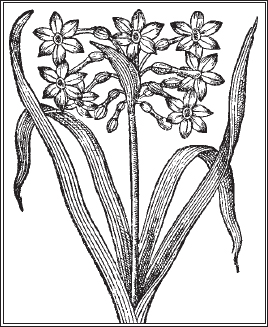
Spring shows what God can do with a drab and dirty world.
Virgil A. Kraft
In the Garden
In the dooryard fronting an old farm-house near the white-wash'd palings,
Stands the lilac-bush tall frowing with heart-shaped leaves of rich green,
With many a pointed blossom ringing delicate, with the perfume strong I love, With every leaf a miracle
Next page
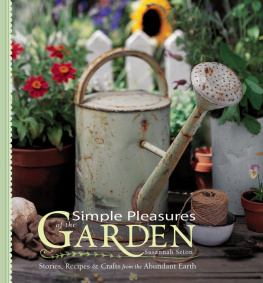


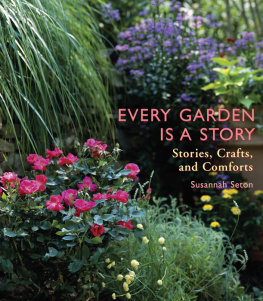


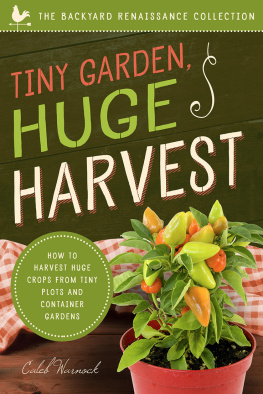

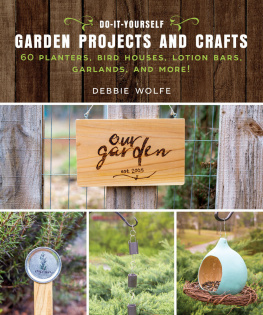

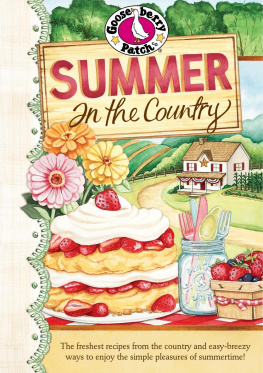
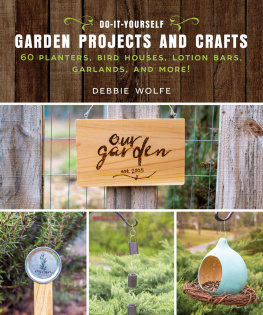
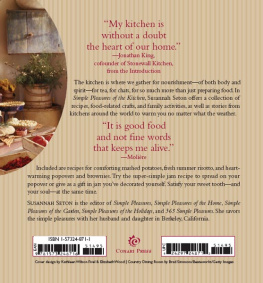

 ike many folks, pleasure is not a concept that is native to me. A serious, A student, high-achieving, puritanical type all my life, I've been what author Stella Resnick calls, in her book The Pleasure Zone, pleasure resistant. It is only recently, in my midforties, that I have begun to try to focus on, indeed relish, the good things in life. The first step was to identify the things that gave me pleasure. In so doing I came to see that they were all very simplelying in warm water, the smell of sweet olive blossoms in the air, the feel of clean sheets, or the sight of a hummingbird darting on my deck. From that foray came the book Simple Pleasures: Soothing Suggestions and Small Comforts for Living Well Year-Round in which my co-authors David Greer and Robert Taylor and I asked people what were the simple things that added delight and meaning to their lives.
ike many folks, pleasure is not a concept that is native to me. A serious, A student, high-achieving, puritanical type all my life, I've been what author Stella Resnick calls, in her book The Pleasure Zone, pleasure resistant. It is only recently, in my midforties, that I have begun to try to focus on, indeed relish, the good things in life. The first step was to identify the things that gave me pleasure. In so doing I came to see that they were all very simplelying in warm water, the smell of sweet olive blossoms in the air, the feel of clean sheets, or the sight of a hummingbird darting on my deck. From that foray came the book Simple Pleasures: Soothing Suggestions and Small Comforts for Living Well Year-Round in which my co-authors David Greer and Robert Taylor and I asked people what were the simple things that added delight and meaning to their lives.